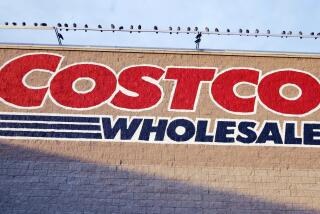Merchants May Insist on Picture ID
- Share via
Question: I am a senior citizen who carries very little cash and writes checks for most of my purchases. As identification I offer my bank guarantee card and driver’s license, which happens to be a renewal of my original license. Most store employees then insist on knowing my date of birth: month, date and year. In a few instances I have successfully argued that my year of birth is not relevant since I am old enough to legally buy anything they sell, and I am not asking for special privileges or discounts offered to seniors.
But I am concerned about how the Privacy Act pertains to this situation. If a prospective employer cannot ask my age, can a merchant receiving payment for his goods basically ask the same question?--L.J.G.
Answer: You’re doing better than I am in at least one respect: Most stores wanting identification won’t accept my renewal license (which doesn’t include my birth date), but insist on seeing the original, which includes not only my picture, but my date of birth as well. Unfortunately, you can’t quite equate a merchant wanting identification with an employer’s application form. It’s true that you don’t have to answer personal questions on an application form if you don’t want to.
The employer-to-be, however, as Herschel Elkins, senior state assistant attorney general, pointed out in our earlier discussion of this, does have the right--in the light of the immigration laws--to make sure that you have a legal right to be in the job market. As a matter of fact, he can be held legally liable if he doesn’t check your citizenship status. But, as Elkins pointed out, while a driver’s license (yes, with your birth date on it) is the most common way of establishing your status, a voter’s registration card will do just as well. But as Jerry Smilowitz, another California assistant attorney general, reminds us: A merchant has no legal requirement hanging over him to accept your check in the first place. It’s a convenience, and/or service, and it isn’t at all unusual to find merchants who just, flat-out, won’t accept checks, period--with or without identification.
And he can require anything he wants in the way of identification to protect himself if he does accept checks. While the negative public relations aspect of it has reduced the practice the past few years, you may remember a period when it wasn’t particularly unusual for a store to have a camera mounted at the check-out counter so that photos and checks accepted could be matched up, and when banks insisted on an ink-less thumb print on the back of checks they processed.
I certainly don’t blame you for being annoyed at such pointless invasions of your privacy, but bear this is in mind: You have the consumer’s ultimate weapon. You can take your business to merchants who aren’t so nosy.
Q: In your recent comment about corporate bonds you neglected to add one important caveat: Some bonds have a provision that they can be paid off before the due date. If you purchase a high-interest-paying bond and pay a big premium for it, said bond may be recalled before the due date, and you have paid the large premium, but will not receive the interest you anticipated.--R.S.
Another letter: I can’t believe your response (about corporate bonds). The man is nearing retirement age and looking for good yields. But he also needs to preserve his capital. What is going to happen to his principal if (interest) rates go up 200 or 300 basis points? You never made that clear. Someone nearing retirement should not be looking at long-term investments that are rate-sensitive.--R.M.
A: I can’t quarrel with the points that both of you have made. Bear in mind, however, that the answer given was purely in response to a question having to do with how one reads the bond table in the newspaper. It was not a definitive “how to” of the bond market as an investment medium. Yes, most bonds can be called if current interest rates drop sharply under the yield at which they were issued. It’s the same situation when a home buyer signs a mortgage carrying a 12% interest rate. When the current mortgage market drops to 9.5% or 10% he, naturally, refinances. So do corporations. And, yes, if you buy a 9% bond and, a couple of years later, you could get 11% at a savings and loan, you’re stuck with either the 9% yield or, if you sell, you do so at a sharp discount. The response was a brief discourse on the reading of the bond tables. I was, in no sense, recommending, nor denigrating, bonds as an investment. This is what you pay an investment adviser to help you with.
More to Read
Sign up for Essential California
The most important California stories and recommendations in your inbox every morning.
You may occasionally receive promotional content from the Los Angeles Times.









